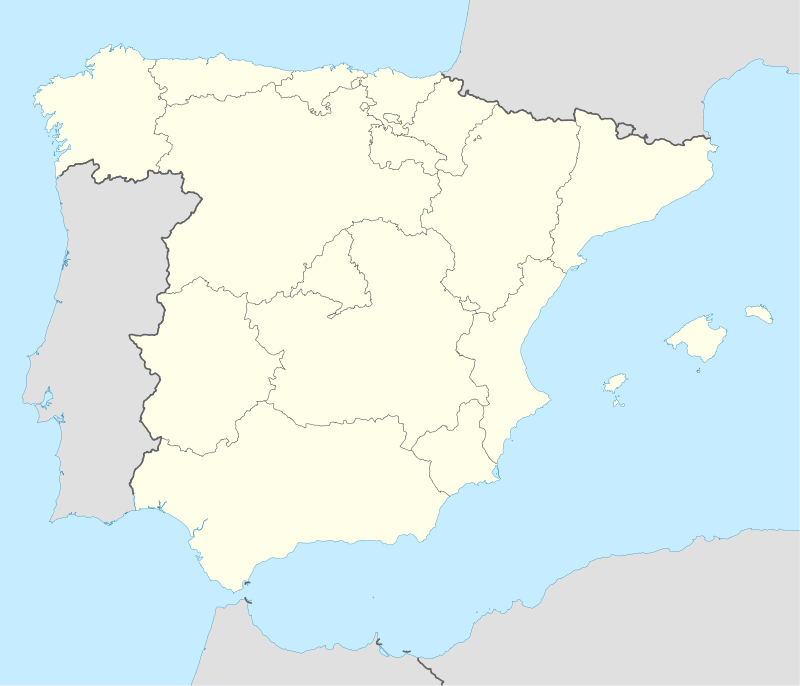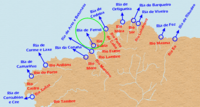Mugardos
| Mugardos | ||
|---|---|---|
| borough and municipality | ||
| ||
 Mugardos Location in Spain | ||
| Coordinates: ES 43°27′16″N 8°14′9″W / 43.45444°N 8.23583°WCoordinates: ES 43°27′16″N 8°14′9″W / 43.45444°N 8.23583°W | ||
| Country | Spain | |
| Autonomous community | Galicia | |
| Province | province of A Coruña | |
| Comarca | Ferrol | |
| Government | ||
| • Mayor | Xosé Fernández Barcia | |
| Area | ||
| • Total | 12.77 km2 (4.93 sq mi) | |
| Elevation | 2 m (7 ft) | |
| Population (2009) | ||
| • Total | 5,565 | |
| • Density | 440/km2 (1,100/sq mi) | |
| INE | ||
| Time zone | CET (UTC+1) | |
| • Summer (DST) | CET (UTC+2) | |
| Website | Official website | |
Mugardos is a small fishing borough and municipality in the comarca of Ferrol, located in the province of A Coruña in the autonomous community of Galicia, northwestern Spain. It is bordered with the municipalities of Ares and Fene.
Climate
Due to its proximity to the Atlantic Ocean, Mugardos does not enjoy extreme oscillation in its weather conditions between winter and summer. The summers tend to be a bit dryer than the winters, but the weather is mild all year round unlike most other parts of the Iberian Peninsula. Like the rest of Galicia, it is rainy and green.
Description and history
The municipality comprises the main township of Mugardos, and several smaller villages. It is part of the historical comarca of Ferrolterra, and is situated near the metropolitan outskirts of the city of Ferrol. The municipality is subdivided into four parroquias ("parishes"): Santiago de Franza, San Vicente de Meá, San Xulián de Mugardos and San Xoán de Piñeiro.
During the 1960s and 1970s Mugardos was much larger than it is now, it included a movie theatre and was regarded as a summer visiting place for many Spaniards in the surrounding areas. Recently, however, it has undergone drastic changes. It is now very small and with the recent oil spills the coastal fishing industry consisting mainly of cockle pickers has temporarily declined, even though a rise in tourism is expected soon, especially with the creation of several new lodgings.
One (unverified, and probably apocryphal) account of the origin of the locality's name comes from the Spanish adjective mojado/a, meaning "soaked, wet", and apparently applied due to the frequent return of the village's fishermen to port drenched in the storms of the area. This is supposed to have morphed over time into the form "Mugardos".
One of the most historic places in Mugardos is "El Castillo de la Palma" (The Palm Castle) which is a castle standing on the southern shore of "La Ria de Ferrol" (the ferrol estuary). The castle was built in 1597 with its original name being "Nuestra Señora de la Palma" (Our Lady of the Palm) and later reformed in 1869. When it was built, the castle was merely used as a "watch tower" but later when it was reformed and became a crucial part of the defensive system of the estuary of Ferrol. Facing the castle is "El Castillo de San Felipe" (The Castle of San Felipe) which forms the other part of the defensive system. These two castles are adjoined by a large and sturdy chain that was used to prevent the entrance of enemy ships. Later, the castle was also used as a military prison where the most famous prisoner, Antonio Tejero, was held captive. Tejero was responsible for the attempted coup de etat in 1981. Recently, the Palm Castle has been bought by a hotel chain and is pending restoration.
Culture and Gastronomy


Festivals
- Fiesta de La Virgen del Carmen: The Carmen Festival is celebrated the weekend of July 16, the day of the Virgin Carmen. On this day there is a ceremony and procession where men hold up the statue of the Virgin and walk her down the promenade.
- Fiesta del Pulpo: The Octopus Festival is celebrated the Saturday before the Carmen festival. On this day Octopus stew is prepared using a recipe that Mugardos is famous for, "Pulpo a la Mugardesa" and many tourists and townMugardos
 Local sea food.
Local sea food.
folk join in the festivities from morning until night with musical groups and flea markets.
- Dia de San Julian: Saint Julian´s day, is the Patron saint of the town.
- La Feria Pirata: The pirate festival has various merchants come to town and sell artisan goods like food and jewelry. Musicians and other attractions are also invited to perform. There are many attractions for small children like a few rides, interactive games and face-painting. The people who attend also dress up as pirates or in medieval inspired clothing.
Economy
Mugardos is a predominantly rural borough, though important industries like shipyards, foundries, and workshops are to be found in nearby Ferrol. Fishing, farming, agriculture and services are the main local industries.
Due to the economic crisis that has stricken the country and town's economy for the past few years, more than 60 shops in the town started accepting in 2011 the obsolete Spanish currency of peseta, accepting it alongside its replacement, the 2002-introduced euro.[1]
Notable residents
- Amada García (1911 – 1938)
References
- ↑ Rainsford, Sarah (March 5, 2011). "Spain town reintroduces peseta to boost economy". BBC News. Retrieved March 5, 2011.
External links
- Site devoted to the art of landscape and nature of Ferrolterra (Spanish)
- Tourist information from Mugardos, Galicia, Spain


